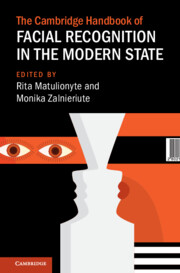Acknowledgements
This book is the outcome of the project ‘Government Use of Facial Recognition Technologies: Legal Issues and Possible Solutions’, funded by the Lithuanian Research Council (2021–2023, agreement number S-MIP-21-38). We sincerely thank our co-investigators in this project, Dr Agnė Limantė and Dr Eglė Kavoliūnaitė-Ragauskienė, for their invaluable co-operation and collaboration in working towards the objectives of this project.
The papers published in this book were first presented at the Facial Recognition in the Modern State international conference, which took place on 15 September 2022 (online); this was organised by the Law Institute of the Lithuanian Centre for Social Sciences and co-hosted by Macquarie University Law School, the University of New South Wales, the Australian Research Council’s Centre for Automated Decision-Making and Society, the LSE Law School, the Internet Governance Project at George Tech, the Centre for Law in the Digital Transformation at the University of Hamburg, and the University of New South Wales Allens Hub. We sincerely thank the organisers and the co-hosts of this conference for contributing to the success of this event, as well as all presenters at the conference for their insightful and highly engaging presentations.
Most of all we express our gratitude to all the thirty-two contributors who wrote chapters for this book. We are grateful for them sharing their knowledge and insights on this topic and appreciate the hard work involved in writing the chapters. We thank you for your patience and co-operation in finalising the manuscript of this book.
We hope the book will contribute to the important international discussion on the challenges posed by automatic facial recognition technologies, how they have been managed so far in different national and regional jurisdictions around the world, and how the regulation of these controversial technologies could look like in the future.

